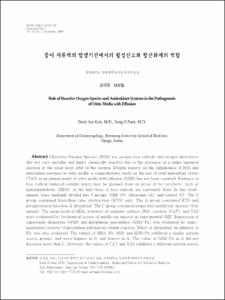중이 저류액의 발생기전에서의 활성산소와 항산화계의 역할
- Keimyung Author(s)
- Kim, Deok Jun; Nam, Sung Il
- Department
- Dept. of Otorhinolaryngology (이비인후과학)
- Journal Title
- Keimyung Medical Journal
- Issued Date
- 2009
- Volume
- 28
- Issue
- 2
- Abstract
- Reactive Oxygen Species (ROS) are oxygen free radicals and oxygen derivatives
that are very unstable and highly chemically reactive due to the presence of a single unpaired
electron at the outer most orbit of the oxygen. Despite reports on the significance of ROS and
antioxidant enzymes in otitis media, a comprehensive study on the use of total antioxidant status
(TAS) in an animal model of otitis media with effusion (OME) has not been reported. Evidence of
free radical-induced cellular injury may be gleaned from an assay of by-products, such as
malondialdehyde (MDA), as the half-lives of free radicals are extremely brief. In this study,
animals were randomly divided into 3 groups: OME (O), Allopruino (A), and control (C). The O
group contained Eustchian tube obstruction (ETO) only. The A group contained ETO and
intraperitoneal injection of allopurinol. The C group contained unoperated middel ear disease-free
animals. The mean level of MDA, activities of xanthine oxidase (XO), catalase (CAT), and TAS
were evaluatied by biochemical assays of middle ear mucosa in experimental OME. Expression of
superoxide dismutase (SOD) and glutathione peroxidase (GSH-Px) was evaluated by semiquantiative
reverse-transcription polymerase chanin reaction. Effect of allopurinol, an inhibitor of
XO, was also evaluated. The valued of MDA, XO, SOD, and GSH-Px exhibited a similar pattern
acorss groups, and were highest in O, and lowest in A. The value of GSH-Px in A did not
decrease more than C. However, the values of CAT and TAS exhibited a different pattern across groups, and were highest in C, but not significantly different in O and A. These results suggest 1)
oxidative stress status (OSS) plays a role in the pathogenesis of OME 2) Allopurinol can reduce
ROS production and oxidative tissue damage in OME 3) CAT and TAS may be predisposing
factors in the pathogenesis of OME. Further study is needed to determine the molecular
mechanism of ROS in OME.
- Alternative Title
- Role of Reactive Oxygen Species and Antioxidant Systems in the Pathogenesis
of Otitis Media with Effusion
- Publisher
- Keimyung University School of Medicine
- Citation
- 김덕준 and 남성일. (2009). 중이 저류액의 발생기전에서의 활성산소와 항산화계의 역할. Keimyung Medical Journal, 28(2), 263–272.
- Type
- Article
- Appears in Collections:
- 2. Keimyung Medical Journal (계명의대 학술지) > 2009
1. School of Medicine (의과대학) > Dept. of Otorhinolaryngology (이비인후과학)
- 파일 목록
-
-
Download
 28-263.pdf
기타 데이터 / 623.47 kB / Adobe PDF
28-263.pdf
기타 데이터 / 623.47 kB / Adobe PDF
-
Items in Repository are protected by copyright, with all rights reserved, unless otherwise indicated.